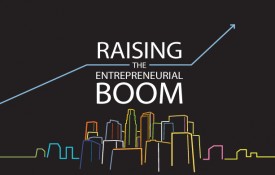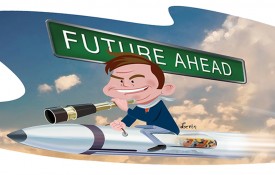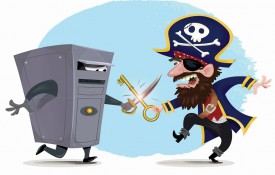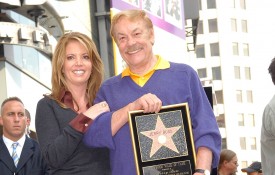
Illustrations by Jamie Ludovise
Los Angeles looks almost nothing like I remember it.
I’ve been in this city for a long time now. I consider LA my home in every way. But the Los Angeles I live in today is vastly different from the one I first met years ago.
Change in LA is the same as in every other city: people come to LA with their dreams and their ideas; some succeed, the majority fail. Los Angeles (like Tokyo, New York, or London) has an incredible rate of turnover. Small retailers, restaurants, bars, and boutiques all struggle for patronage in our fair city. Even celebrities are susceptible to the continuous churning – a here-today, has-been tomorrow situation. We live in a city that is always in conflict with itself, a near constant maelstrom of art and influence. To visitors and transplants, LA can seem nasty, brutish, and massive; to the untrained eye, it’s just chaos in So-Cal. But to those of us that have found the wherewithal to call Los Angeles home, we know it’s just LA doing what LA does best.
People struggle for success all over the world and in every city, but most success is local or national at best. Only LA embodies a continuous struggle for global cultural capital. While Tokyo vies with Copenhagen for the monopoly on world design, and New York competes with Paris for the largest literary presence on the planet, only Los Angeles revels in its heterogeneity. You may consider my reasoning reductionary; I’d argue LA is a beast with many heads you don’t know as well as you think you do. From my perspective, each neighborhood offers its own gladiator to compete in this cultural coliseum. The winners receive fame on a global level. May the best medium win.
But more exciting than the long-standing battles between incumbents (TV vs. movies, 10th Doctor vs. 11th), is seeing all the new battles set to shape the future.
Youtube
One of the most surprising competitions to arise in recent memory isn’t that of the YouTube youth vs. Hollywood’s old-guard, but the old-guard amongst each other, clamoring to serve a class of creators with more clout than anyone expected. While everyone over the age of 18 knows who Brad Pitt is, a lot of younger teenagers simply don’t. This isn’t a matter of exposure to Hollywood, this is a question of who teens appear to be searching for these days. A 12-year-old is more likely to empathize with another 12-year-old than an adult star, making a star’s allure much harder to justify to a maturing generation. YouTube personalities are often closer in age to their target demographic and far easier to contact.
YouTube personalities command fan-bases in the millions. Their channels far outproduce TV and movies in terms of content hours created. The difference in production is staggering, and YouTube stars work around the clock to stay relevant to their younger audiences. Of course, the hard work pays serious dividends. LA based YouTube personality Jordan Maron (AKA CaptainSparklez) has been cultivating an incredible following over his five years of recording and producing video game walkthroughs. In that time, Jordan has amassed almost 9 million subscribers to his YouTube Channel and more than 1.5 billion views for his videos. He has become a powerful force in the video game industry and has even begun designing his own game.
YouTube personalities do so much more than videogame walkthroughs. Consider Jenna Marbles, the LA based comedian turned dog-toy maverick. With more than 14 million subscribers, she ranks as the 14th top channel and the top female celebrity on the platform. Michelle Phan, another LA-based YouTube star, has more than 7 million subscribers and over 1 billion combined views of her videos. Best of all, the YouTube star isn’t limited to a single format. Phan has deals with L’Oreal, a book soon to be released, and an ecommerce beauty startup called “Ipsy” that makes a cool $84M annually.
Due to the glut of content, both Hollywood and YouTube are investing heavily in the YouTube star. But likewise, the YouTube star is heavily investing in LA. A content creator with an audience of tens of thousands requires a team to function. They need agents, editors, publicists, and other avenues to capitalize on. With Hollywood at their back, a YouTube personality can gain international fame. With YouTube under their belts, Hollywood is able to target the hardest to reach and most coveted audience: children (convert them young; retain them ‘til death). Recognizing the growing symbiosis, YouTube created an immense complex to help raise their stars’ production values. And with their 45% take on the revenue, it is in YouTube’s best interest to keep production going. As more wannabe and established YouTuber’s come to LA to make it on the smallest screen, we should continue to see the competition grow and YouTube’s influence increase.
Esports
YouTube is a new industry commanding increased respect within the larger entertainment industry. Electronic sports (aka esports or competitive gaming), on the other hand, is its own creature – a billion-dollar giant sleeping beneath LA’s surface. The NFL made $9B in 2013 and hopes to get revenues close to $25B in only a couple of years, seemingly unmatchable in terms of sports profit power. I know that everyone reading this article knows about the National Football League, but have you heard of “League of Legends?” You probably have – it’s that game you or your son/daughter play. The learning curve is high, the characters varied, and LoL, as it is better known, is the biggest esport on the planet. While that distinction used to belong to Korea’s StarCraft league, LA’s Riot Games has blown the professional Starcrafters out of the water. South Korea’s infatuation with Blizzard appears to be on the wane, while League of Legends continues to gain serious steam at home and abroad.
The three biggest esports right now are League of Legends, Starcraft, and Call of Duty. Those games are published by Riot Games, Blizzard, and Activision, respectively. All three are based in Los Angeles. When I started Activision, I wanted to make LA into a major video game hub. Now, college leagues are popping up. Stadiums are selling out. League lays claim to 27 million daily players and close to 67 million a month. The prizes are whopping – $1M for a winning team to split among the players. The sponsorships are rolling in as players make six figures a year. And even more revolutionary is the fact the whole thing is free to play.
Esports has a huge advantage over a previously established (some would say institutional) sport like football, namely the medium’s accessibility. League of Legends might exist in the Staples Center, but it also exists on laptops around the world, on sites like Twitch and on illegal streams. League has the potential to be on every device at any time, while the NFL keeps itself constrained to cable. One third of America watched the 2014 Super Bowl. I see no reason why one third of the world won’t one day watch the largest esport tournament.

crowdfunding
Crowdfunding, like esports, is a new and unique industry. LA has a thing for really unique industries.
Doing even minor research on the subject turns up almost 50 LA based Crowdfunding platforms across almost every industry. Entertainment (Slated), Real Estate (RealtyMogul), Entrepreneurs (StartEngine), Charities (Causora), and other funding reasons (Crowdfunder) are headquartered in LA. But this is just a fraction of the sites that exist. Theater, writing, public works, food justice, public housing, LGBTQ rights, and every other worthy cause (and the not so worthy) under the sun can be crowdfunded – and probably has a dedicated platform already. StartEngine, my personal crowdfunding project, specializes in Title III equity crowdfunding for non-accredited investors – an industry that literally doesn’t exist yet, (It will, pending SEC approval.)
If given the opportunity, Crowdfunding could be just as dynamic an industry as esports. It could even prove to be revolutionary if it manages to break open the financial industry. Crowdfunding has the opportunity to deconstruct the traditional top-down funding models. Allowing the market to decide where investments should go will mean entrepreneurs are no longer beholden to third-party stakes. Crowdfunding will cut out investment middlemen and return the act of business creation to the entrepreneurs. By disrupting finance, Crowdfunding could affect every industry. I believe crowdfunding will give birth to more exciting and exemplary films, the next great American novel, and music for the ages. It could potentially determine our future as a city or a nation.
Crowdfunding is another economic giant sleeping in our midst. Perhaps it is the burgeoning industry’s versatility that makes it so successful in Los Angeles – the malleability of the crowdfunding mechanic to any situation makes it a perfect companion to a city as chaotic as LA. And that may be why I feel so comfortable and wanted to go into Crowdfunding so badly. I barely recognize this city anymore, but I continuously rediscover it through an industry that can reach every street. Crowdfunding is an industry that embodies daily struggle, the quality that makes Los Angeles, well, Los Angeles.
Without the constant churn, without the vortex, LA would just be another American city. And without a physical arena for the world to express the daily cultural struggle, we would not share information and change as quickly as we do. This massive share of information leads to styles and trends that influence our culture. More often than not, the culture of the time inspires the policy and the technology of the era as well. We see the trends of tomorrow doing battle on the streets today, in the movies, the TV we take in, and in the businesses that are built each day.
This is the future of the country and the planet as we know it taking shape right before our eyes. And what’s more is that we can control what shape it takes. Human history is filled with cases of people exerting their wills to steer our species – for better or for worse – but it happens. Unconscious human behavior doesn’t give rise to YouTube. We are a race that celebrates heroes, leaders, and stars – people who can impose their will to affect the future. Without Alexander of Macedon’s will for conquest (without Jobs, Mao, or FDR), our future would look very different. People who impose their will upon the future within the present determine the path we as a species take. And where else do you find the greatest concentration of these people right now? I’d argue that LA is that place.













































